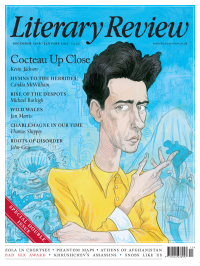Jeremy Lewis
A-Changin’ Times
The New Yorker Book of the 60s: Story of a Decade
By Henry Finder (ed)
William Heinemann 705pp £30
The previous volume in this marvellous series of New Yorker anthologies was devoted to the 1950s. It opened with an account of how Jackie Robinson, the star player of the Brooklyn Dodgers, was working in a hardware store and was followed by A J Liebling’s account of the Archie Moore–Rocky Marciano fight, which ends with him overhearing two policemen wondering why Disney never filmed Kafka’s Metamorphosis. A sprightly survivor from the era of Harold Ross’s editorship, Liebling resurfaces in The New Yorker Book of the 60s, this time writing about Cassius Clay – he notes his ‘skittering style, like a pebble scaled over water’. However, the opening section of the new book, though full of good things, is altogether more serious: it includes early extracts from Rachel Carson’s Silent Spring, James Baldwin’s The Fire Next Time and Truman Capote’s In Cold Blood, as well as Hannah Arendt’s reports of the Eichmann trial and Jonathan Schell’s brilliant account of US troops occupying a Vietnamese village.
Ross had founded the New Yorker in 1925 and prided himself on producing a witty, sophisticated and impeccably written metropolitan magazine aimed above all at New Yorkers, an ambition embodied in its famous logo of a top-hatted socialite peering down on the world through a monocle. Ross was

Sign Up to our newsletter
Receive free articles, highlights from the archive, news, details of prizes, and much more.@Lit_Review
Follow Literary Review on Twitter
Twitter Feed
How to ruin a film - a short guide by @TWHodgkinson:
Thomas W Hodgkinson - There Was No Sorcerer
Thomas W Hodgkinson: There Was No Sorcerer - Box Office Poison: Hollywood’s Story in a Century of Flops by Tim Robey
literaryreview.co.uk
How to ruin a film - a short guide by @TWHodgkinson:
Thomas W Hodgkinson - There Was No Sorcerer
Thomas W Hodgkinson: There Was No Sorcerer - Box Office Poison: Hollywood’s Story in a Century of Flops by Tim Robey
literaryreview.co.uk
Give the gift that lasts all year with a subscription to Literary Review. Save up to 35% on the cover price when you visit us at https://literaryreview.co.uk/subscribe and enter the code 'XMAS24'